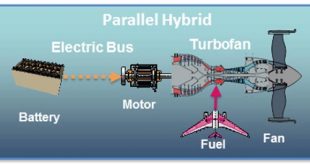3D printing or additive manufacturing is ongoing revolution in manufacturing with its potential to fabricate any complex object and is being utilized from aerospace components to human organs, textiles, metals, buildings and even food. Additive manufacturing is defined by ASTM International as the process of joining materials together, layer by …
Read More »Electromagnetic Propulsion systems (EMP/EMPS) for Aerospace and Military
Electromagnetic propulsion (EMP) is the principle of accelerating an object by the utilization of a flowing electrical current and magnetic fields. The term electromagnetic propulsion (EMP) can be described by its individual components: electromagnetic – using electricity to create a magnetic field, and propulsion – the process of propelling something. …
Read More »Synthetic and Sustainable Aviation fuels (SAF)
A big push has been to increase the efficiency of aircraft engines, mainly to make them go faster, to fly higher and use less fuel. Now a new concern has come to the fore, that of environment. We have to use as little fuel as possible, create as little …
Read More »Air-launch-to-orbit brings space launch to any airport and covert military satellite launches
There are three major launch types for spacecraft: vertical takeoff, horizontal takeoff, and air launch. The cost of launching into space is often measured by the change in velocity required to reach the destination orbit, known as delta-v or Δv. The amount of Δv required for a mission depends on …
Read More »Electric Vehicle Charging technologies and innovations
A typical passenger vehicle emits about 4.6 metric tons of carbon dioxide per year. This assumes the average gasoline vehicle on the road today has a fuel economy of about 22.0 miles per gallon and drives around 11,500 miles per year. Every gallon of gasoline burned creates about 8,887 grams …
Read More »Propulsion technologies for Space logistics, In-Space Assembly (OOS / ISA), automated satellite on-orbit servicing (OOS)
In the history of spaceflight, almost all spacecraft have been manufactured and assembled on the ground, then integrated into a launch vehicle for delivery into orbit. This approach imposes significant limitations on the size, volume, and design of payloads that can be accommodated within the fairing of a single launch …
Read More »Hybrid-Electric Propulsion for Military aircraft to power radars to laser weapons payloads
The civil global aviation market has experienced considerable economic growth in recent years and will keep increasing. It is estimated that around 1300 new international airports will be required, and the commercial aircraft fleet will double by 2050, with a projected passenger throughput of 7.2 billion in 2035. This growth …
Read More »Electric Vehicle Charging Infrastructure Market
A typical passenger vehicle emits about 4.6 metric tons of carbon dioxide per year. This assumes the average gasoline vehicle on the road today has a fuel economy of about 22.0 miles per gallon and drives around 11,500 miles per year. Every gallon of gasoline burned creates about 8,887 grams …
Read More »Flow batteries are emerging storage technologies for data centers to military microgrids
Energy storage is becoming increasingly important to the power industry. Lithium-ion battery technology has been implemented in many locations, but flow batteries offer significant benefits in long-duration usage applications and situations that require regular cycling throughout the day. With the increasing demand for continuous power supply in all major …
Read More »Ultra-high efficiency, Perovskite tandem solar cells promise solving the world energy crisis and secure energy for military
Increasing energy demand, environmental issues and limited availability of fossil fuels are demanding the research on sustainable and renewable energy resources. The sun is ultimate source to accomplish clean energy demand and photovoltaics, also known as solar PV, have been growing exponentially to harness it. The global solar photovoltaics (PV) …
Read More » International Defense Security & Technology Your trusted Source for News, Research and Analysis
International Defense Security & Technology Your trusted Source for News, Research and Analysis


